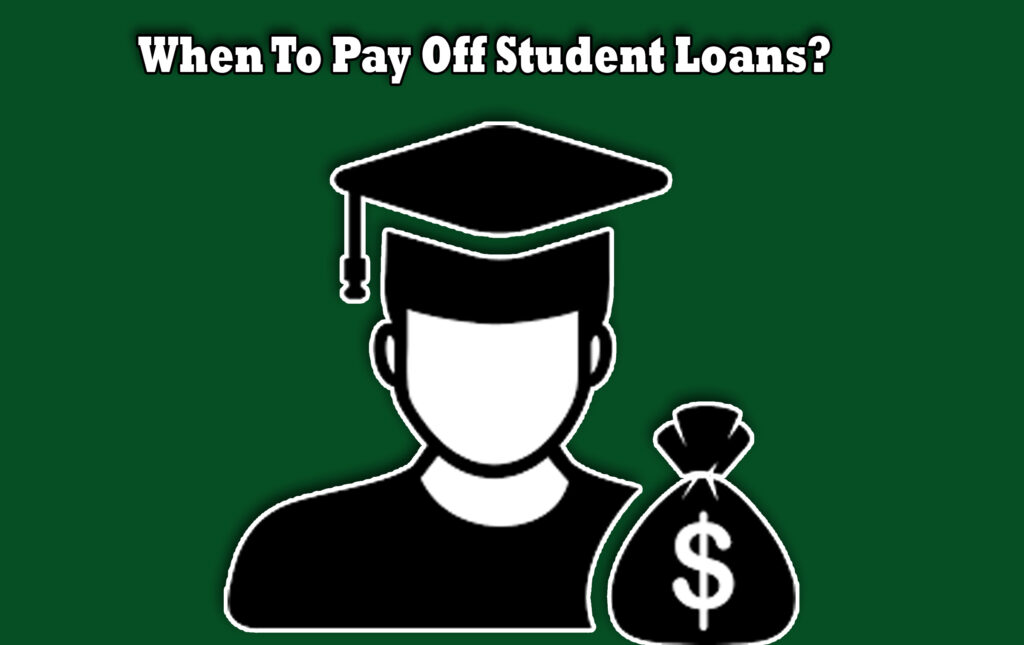When To Pay Off Student Loans – It’s a well-known fact that student loans are a necessity for many graduates. However, the financial responsibility they leave behind can linger long after graduation caps and gowns have been donned.

Deciding when to pay off student loans is one of the most significant financial decisions you’ll make post-college. While the urge to become debt-free as soon as possible is strong, it’s essential to evaluate your overall financial picture before jumping into aggressive repayments.
Furthermore, student loans often come with flexible repayment terms and relatively low-interest rates compared to other types of debt.
This means that while paying them off quickly can offer peace of mind and save money on interest, it isn’t always the most financially strategic move. Let’s look at some of the most strategic times and duration you can pay off your student loans.
Assess Your Loan Terms and Interest Rates
Before you decide when to pay off your loans, you must first understand what you’re working with. Every student loan is different; some are federal, others private; some have fixed interest rates, while others vary.
- Federal vs. Private Loans: Federal student loans often have lower interest rates, income-driven repayment plans, and forgiveness options. Private loans may lack these benefits, which makes them a priority to pay off first.
- Subsidized vs. Unsubsidized Loans: Subsidized loans do not accrue interest while you’re in school or during deferment. On the other hand, unsubsidized ones do.
- Interest Rate Considerations: If your loans have high interest rates, paying them off sooner can save you thousands in the long run.
Understanding these details helps you prioritize which loans to pay off early and which can be safely deferred.
Establish a Strong Financial Foundation First
Paying off student loans shouldn’t come at the cost of financial security. Before you speed or increase your payments, you need to ensure that your financial base is solid.
- Build an Emergency Fund: Ideally, you should have at least 3-6 months’ worth of expenses saved in case of emergencies like job loss or unexpected medical bills.
- Pay Off High-Interest Debt First: Credit card debt and personal loans usually carry much higher interest rates than student loans. It’s often smarter to tackle those before making extra payments on student loans.
- Stabilize Your Income: If your job or income is uncertain, it may be wiser to stick to minimum payments until you have a stable financial footing.
A strong foundation ensures that you won’t be caught off guard while focusing on student loan repayment.
Consider Your Career Path and Loan Forgiveness Opportunities
Your career choices can significantly influence your repayment strategy. Some careers offer loan forgiveness programs that can make early repayment unnecessary or even unwise.
- Public Service Loan Forgiveness (PSLF): If you work in public service or for a non-profit, you may qualify for PSLF after making 120 qualifying payments.
- Teacher Loan Forgiveness: Teachers in low-income schools may be eligible for partial loan forgiveness after five years.
- Income-Driven Repayment Forgiveness: Federal loans under income-driven repayment plans may be forgiven after 20-25 years.
Before you start aggressively paying off your loans, check whether your career path could eliminate a portion of your debt through forgiveness programs.
Evaluate Your Long-Term Financial Goals
Student loan repayment must be balanced with other financial aspirations. Whether you’re planning to buy a home, start a business, or save for retirement, your goals should influence how aggressively you tackle your loans.
- Investing vs. Repayment: If your loan interest rate is lower than potential investment returns (e.g., 3% loan vs. 7% average stock market return), it might make more sense to invest the money instead of rushing to pay off the loan.
- Saving for Major Life Events: Planning for a wedding, children, or travel may be more valuable in the short-term than eliminating debt.
- Retirement Savings: Don’t sacrifice retirement savings just to pay off student loans early. Compound interest favors starting early.
Having a clear vision of your long-term goals can help determine whether paying off loans early aligns with your life plans.
Make Extra Payments Strategically
Once you’ve built an emergency fund, paid off high-interest debt, and ensured you’re not missing out on forgiveness programs, you might be ready to pay off student loans more aggressively.
- Target High-Interest Loans First: Pay off the highest-interest student loans while making minimum payments on the others.
- Use Windfalls Wisely: Bonuses, tax refunds, and gifts can be put toward student loans without disrupting your regular budget.
- Avoid Prepayment Penalties: Most student loans do not penalize prepayment, so any extra amount you contribute directly reduces your principal.
Strategic extra payments can help you save on interest and reduce the life of your loan without sacrificing financial flexibility.



